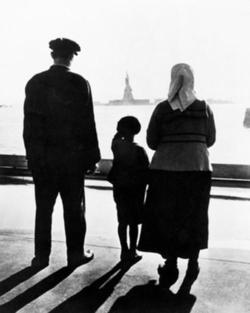Americas tiny armed forces were a joke before its belated entry into World War I. A draft was swiftly implemented, as local history writer David Laskin relates in The Long Way Home: An American Journey From Ellis Island to the Great War (new in paper), with peculiar results. Our nation then had an extraordinarily high rate of immigration, making our instant Army a grand experiment in multiculturalim long before the term even existed. One-third of the U.S. was first- or second-generation immigrant, and many spoke no English. But then as now, serving in the military was a fast track to citizenship; while others who were draftedor enlistedwere simply happy to have a paycheck and regular meals. Until they got to the frontlines, of course, where the melting pot was shot full of German machine gun bullets and poisoned with mustard gas. Laskin gives us a 12-man cast of ethnic typesIrish, Italian, Slovak, etc.and rapidly shifts among their stories. As a result, whether by accident or design, individual details and battles blur together into a single grand immigrant narrative: hardship and striving, discrimination and nativism, patriotism both coerced and earned. Laskin also treads lightly on some obvious historical parallels: German-speaking Hutterites, pacifists because of their religion, were locked up and treated worse than detainees at Gitmo. Sauerkraut was renamed liberty cabbage. And ex-President Teddy Roosevelt declared, There is no such thing as a hyphenated American who is a good American. Its a sentiment that Laskins book soundly rebuts. BRIAN MILLER
Wed., April 20, 7 p.m., 2011




